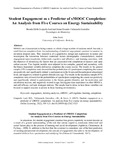| dc.contributor.author | Guajardo-Leal, Brenda E. | |
| dc.contributor.author | Valenzuela González, Jaime Ricardo | |
| dc.contributor.author | Scott, John | |
| dc.date.accessioned | 2018-11-28T16:22:56Z | |
| dc.date.available | 2018-11-28T16:22:56Z | |
| dc.date.issued | 2019 | |
| dc.identifier.doi | http://dx.doi.org/10.24059/olj.v23i2.1523 | en_US |
| dc.identifier.uri | http://hdl.handle.net/11285/632315 | |
| dc.description.abstract | MOOC are characterized as being courses to which a large number of students enroll, but only a
small fraction completes them. An understanding of students' engagement construct is essential
to minimize dropout rates. This research is of a quantitative design and exploratory in nature, and
investigates the interaction between contextual factors (demographic characteristics), student
engagement types (academic, behavioral, cognitive and affective), and learning outcomes, with
the objective of identifying the factors that are associated with completion of massive and open
online courses. Two logistic models were adjusted in two samples, general and secondary, with
the binary dependent variable defined as completes the course yes/no. The results in the general
sample (15% completion rate) showed that the probabilities of a participant completing the
course are positively and significantly related to participation in the forum and the participant
educational level, and negatively related to gender (female) and age. The results in the secondary
sample (87% completion rate) showed that the probabilities of a participant completing the
course are positively and significantly related to participation in the forum, gender (female), and
the motivation and satisfaction indexes, and negatively related to age, having previous
experience in other MOOCs, and self-efficacy and task strategies indexes. The results lead to
ideas on how these variables can be used to support students to persist in these learning
environments. | |
| dc.language.iso | eng | en_US |
| dc.relation | Esta investigación (tesis/ proyecto de campo) es un producto del proyecto 266632 “Laboratorio Binacional para la Gestión Inteligente de la Sustentabilidad Energética y la Formación Tecnológica” financiado a través de Fondo CONACYT SENER de Sustentabilidad Energética (S0019201401). | en_US |
| dc.relation.ispartof | 266632-CONACYT-SENER-S0019201401 | |
| dc.title | Student engagement as predictor of xMOOC completion: An analysis from five courses on energy sustainability | en_US |
| dc.type | Artículo / Article | en_US |
| dc.identifier.journal | Online Learning Journal | en_US |
| dc.subject.keyword | engagement, learning analytics, xMOOC, self-regulated learning, completion | en_US |
| dc.description.notes | Abstract
MOOC are characterized as being courses to which a large number of students enroll, but only a small fraction completes them. An understanding of students' engagement construct is essential to minimize dropout rates. This research is of a quantitative design and exploratory in nature, and investigates the interaction between contextual factors (demographic characteristics), student engagement types (academic, behavioral, cognitive and affective), and learning outcomes, with the objective of identifying the factors that are associated with completion of massive and open online courses. Two logistic models were adjusted in two samples, general and secondary, with the binary dependent variable defined as completes the course yes/no. The results in the general sample (15% completion rate) showed that the probabilities of a participant completing the course are positively and significantly related to participation in the forum and the participant educational level, and negatively related to gender (female) and age. The results in the secondary sample (87% completion rate) showed that the probabilities of a participant completing the course are positively and significantly related to participation in the forum, gender (female), and the motivation and satisfaction indexes, and negatively related to age, having previous experience in other MOOCs, and self-efficacy and task strategies indexes. The results lead to ideas on how these variables can be used to support students to persist in these learning environments. | en_US |
| dc.subject.lemb | Estados Unidos de América / United States | en_US |
| dc.relation.isPartOf | 266632-CONACYT-SENER-S0019201401 | |
| refterms.dateFOA | 2018-11-28T16:22:57Z | |
| html.description.abstract | <html>
<head>
<title></title>
</head>
<body>
<p>MOOC are characterized as being courses to which a large number of students enroll, but only a
small fraction completes them. An understanding of students' engagement construct is essential
to minimize dropout rates. This research is of a quantitative design and exploratory in nature, and
investigates the interaction between contextual factors (demographic characteristics), student
engagement types (academic, behavioral, cognitive and affective), and learning outcomes, with
the objective of identifying the factors that are associated with completion of massive and open
online courses. Two logistic models were adjusted in two samples, general and secondary, with
the binary dependent variable defined as completes the course yes/no. The results in the general
sample (15% completion rate) showed that the probabilities of a participant completing the
course are positively and significantly related to participation in the forum and the participant
educational level, and negatively related to gender (female) and age. The results in the secondary
sample (87% completion rate) showed that the probabilities of a participant completing the
course are positively and significantly related to participation in the forum, gender (female), and
the motivation and satisfaction indexes, and negatively related to age, having previous
experience in other MOOCs, and self-efficacy and task strategies indexes. The results lead to
ideas on how these variables can be used to support students to persist in these learning
environments.</p>
</body>
</html> | en_US |
